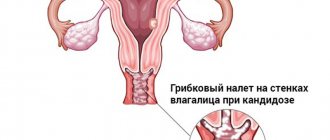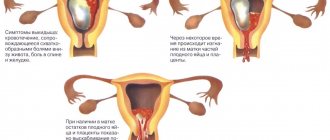The arrival of a long-awaited baby always brings with it both joy and anxiety. This little bundle of joy needs an eye and an eye, but most of all the young mother also needs care. Various postpartum symptoms can affect the entire body. And the main signal about complications can be sent by menstruation during breastfeeding.
Many young mothers are concerned about whether their periods can resume while breastfeeding. and once they appear, is breastfeeding during this period good for the baby? How does menstruation affect breastfeeding? Will menstruation go away during lactation from taking hormonal medications? We will answer these and other questions in this article.
Lactation and menstrual cycle
The cycle in women of reproductive age has different durations, which normally range from 21 to 35 days. It is known that the first day in the cycle coincides with the beginning of menstruation.
There are two phases in each cycle. During the follicular phase, several follicles grow under the influence of FSH, actively synthesizing estrogens. One follicle undergoes full development and becomes dominant. Hormones of the first phase are necessary for the growth of the endometrium, into which the fertilized egg is implanted after fertilization.
Approximately in the middle of the cycle, as FSH accumulates, a surge of LH is observed, leading to rupture of the membranes of the dominant follicle and the release of a mature egg. Fertilization can take place over the next 1-2 days. The follicle membranes contribute to the formation of the corpus luteum, which produces the pregnancy hormone progesterone. It supports the development of the embryo and fetus in the first weeks after successful conception. If pregnancy does not occur, the corpus luteum regresses before the next menstruation.
While breastfeeding, the nature of your periods changes. Lochia or postpartum discharge is not considered menstruation. In the absence of lactation or rare breastfeeding of the baby, menstruation may resume after the end of lochia.
When does menstruation begin during breastfeeding?
Menstruation when breastfeeding may be absent for a long time if the child is on full breastfeeding. After the introduction of complementary foods or artificial feeding, the number of feedings is reduced, which contributes to the resumption of menstruation.
Lactational amenorrhea can be observed for more than a year, which is considered normal. Menstruation is completely absent during this period. Since the maturation of eggs in the ovaries is not observed, pregnancy cannot occur, including through unprotected sexual intercourse.
Reference! Menstruation resumes earlier during lactation in dark-haired women with average build.
On average, the restoration of the menstrual cycle after childbirth occurs after 6-12 months, regardless of the presence of breastfeeding.
Hypomenorrhea - what kind of pathology is it?
In medicine, scanty discharge during menstruation is called hypomenorrhea. The main sign of this phenomenon is inflammation or dysfunction of the menstrual cycle.
Hypomenorrhea is characterized by a decrease in the duration of discharge and a small amount of blood released by the body. To clearly understand whether this is considered a serious pathology and evidence that a woman’s body is undergoing serious restructuring or the development of any diseases, you need to understand exactly which periods are considered scanty.
Scanty discharge is considered to be in the form of a slight trace or drops of brown color (can be light brown or dark brown).
Normal menstruation is bright red. Normally, the loss of female menstrual blood is 50-150 ml, with hypomenorrhea only 50, sometimes even less.
In fact, every woman is required to keep a calendar of the beginning and end of her period, this allows her to control women’s health, especially if she plans to become pregnant in the future.
Menstruation while breastfeeding
Critical days during lactation can change their character, which is associated with the formation of the cycle and the effect of prolactin. Menstruation during breastfeeding after cesarean section does not have any distinctive features.
Heavy periods after childbirth while breastfeeding
Often, periods after childbirth during breastfeeding are characterized by the presence of heavy bleeding. Their increase may be associated with increased ovarian function.
Important! With heavy, prolonged bleeding, there is a risk of developing iron deficiency anemia, which is especially dangerous during lactation.
Scanty periods after childbirth while breastfeeding
Sometimes the first menstruation is characterized by slight spotting associated with high prolactin levels and frequent feedings. As a rule, after 2-3 months the cycle returns to normal.
Irregular periods after childbirth while breastfeeding
Many women note that periods during breastfeeding are irregular. The cycle may be unstable, which is normal. Typically, restoration of the duration and regularity of the cycle takes 2-3 months.
Delayed menstruation during breastfeeding
Delayed menstruation with breastfeeding may occur during the first cycles after the resumption of ovarian function. This is due to the restoration of the menstrual cycle.
If a woman is sexually active without contraception, a pregnancy test must be performed. Lactation is not always accompanied by a lack of ovulation. A negative test in the event of a missed period while breastfeeding will help rule out possible conception.
Attention! The absence of menstruation one year after childbirth against the background of stable lactation is not considered a delay.
Why don't you have periods while breastfeeding?
Menstruation during stable lactation may be absent for 1-2 years. This is not a cause for concern if the woman is healthy. As complementary foods are introduced and the number of feedings is reduced, the menstrual cycle will gradually restore. After stopping breastfeeding, menstruation returns within approximately 9-10 weeks.
How to induce menstruation during breastfeeding
Prolonged absence of menstruation due to lactation sometimes causes women to feel anxious. Gynecologists say that lactational amenorrhea is a normal physiological process that does not require treatment.
The resumption of menstruation occurs at different times. The frequency of applications is essential, especially at night. Lactation is often accompanied by the onset of menstrual periods 1-2 years after delivery.
To induce menstruation, breastfeeding must be reduced or completely stopped. A woman can consult a doctor to prescribe medications. You can use folk remedies only after consulting a specialist.
Important! WHO recommends exclusive breastfeeding for the first 6 months of the baby. It is advisable to continue breastfeeding until the child reaches 2 years of age.
What should be considered a pathology and what is normal?
Gynecological standards for the menstrual cycle are within normal limits:
- Painless or slightly painful
- Last no more than 5 days
- Intermediate time interval between cycles 21-35 calendar days
Deviations from the norm include:
- Rare menstruation (opsomenorea) – once every 1.5 or 2 months
- Scanty discharge – 50 ml or less
- Shortened (oligometry) – 3 days
- Intermittent (spanimenorrhea) 2 to 4 times a year
The scarcity of discharge may indicate the onset of menopause - this phenomenon is considered natural and is not a deviation from the norm. Occurs mainly at the age of 45, although cases have been recorded in which the decline of reproductive functions occurs in the period from 38 to 40 years.
How do periods affect breastfeeding?
Sometimes there is pain and burning in the nipple area due to their sensitivity due to hormonal changes. With regular breastfeeding, lactation is stable, and the amount of breast milk during menstruation does not decrease.
Can milk disappear if menstruation starts?
The only condition for maintaining adequate lactation is regular breastfeeding. Breast milk is produced in response to suckling. Special teas and foods that stimulate lactation are auxiliary methods and are often ineffective.
Sometimes the disappearance of milk is associated with lactation crises, which are temporary. Breast milk may stop being produced for a few hours or 1-2 days. However, frequent applications help eliminate this physiological problem.
Does the taste of breast milk change during menstruation?
Some women mistakenly believe that during menstruation, breast milk becomes bitter. This opinion is associated with the restless behavior of a breastfed baby.
Contrary to popular belief, the resumption of menstruation does not affect the taste of mother's milk. The child's possible anxiety is due to a new combination of hormones in the mother during her period. Your nipples may become more sensitive. During menstruation, breast milk is released from the ducts worse.
Restoring menstruation after childbirth while breastfeeding
Restoration of menstrual function is sometimes accompanied by changes in the duration, intensity and nature of bleeding. In most cases, these phenomena are considered as a variant of the norm. However, if concomitant pathological signs appear, a consultation with a gynecologist may be required.
If a woman feeds her baby strictly at set hours, menstruation may begin 2 months after birth. If there are no critical months during the year, you should use contraception and regularly take a pregnancy test. Ovulation without menstruation is sometimes observed during breastfeeding. Timely examination and examination also helps to exclude hyperprolactinemia.
Critical days after childbirth during breastfeeding, which are of a mixed nature, usually occur 4 months after birth. The first bleeding may be profuse. If there are clots and significant blood loss, it is necessary to exclude pathology.
Spotting may appear due to decreased prolactin production. The speed of menstruation restoration depends on the following factors:
- lack of sleep;
- assistance from relatives in caring for the child;
- postpartum depression;
- complete nutrition;
- the woman’s age and medical history;
- complications during childbirth.
Irregular menstruation does not have to be constant. Scanty or heavy discharge is possible only during the first cycles. Severe pain often indicates infection or excessive contractile function of the myometrium.
Diagnosis of potential diseases
With scanty postpartum menstruation, diagnosis is necessary to clarify the causes and degree of hypomenorrhea, indicating the preservation of the complexing properties of women's health. There are two degrees:
- The first is characterized by the reciprocal appearance of menstruation by progested substances. It is evidence of a decrease in the synthesis of progesterone by the ovaries, the preservation of estrogen products.
- The second phase of hypomenorrhea. Here, neither the presence of progesterone nor esterogens are the basis for scanty menstruation. Their presence may indicate that pathological disorders are occurring in the body.
The second stage is diagnosed in laboratory conditions, where the task of the study is to establish the presence of a certain list of hormones:
- Estrogens
- Prosterogens
- Testosterone
- Luteinizing hormones
- Follicle-stimulating
- Prolactin
- Liberins of the hypothalamus
Based on the diagnostic results, the third stage can be organized. It is necessary to establish the causes of deviations from the norm or the development of pathological changes in the body. Common causes of pathologies:
- Inflammation in the brain
- Mental or psychological disorders
- Head injuries
- Metabolic disorders
- Epilepsy
- Disturbances in the vegetative-vascular system
- Sclerocystic ovaries
- Excessive postpartum blood loss
- Dramatic weight loss
- Hyperprolactinemia
Measures used in diagnosis:
- Ultrasound of the ovaries, appendages and uterine body
- X-ray of the sella turcica
- Electroencephalography
- Hysteroscopy
- The presence of synechiae in the uterine body, also known as Asherman's syndrome
And other related or additional studies.











